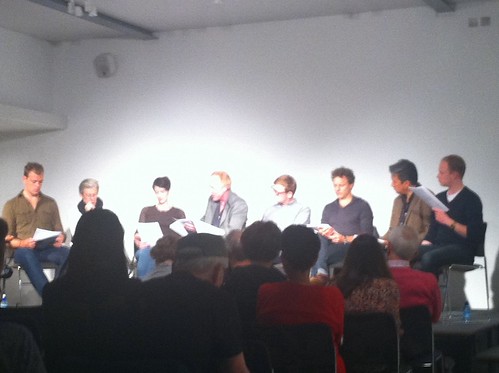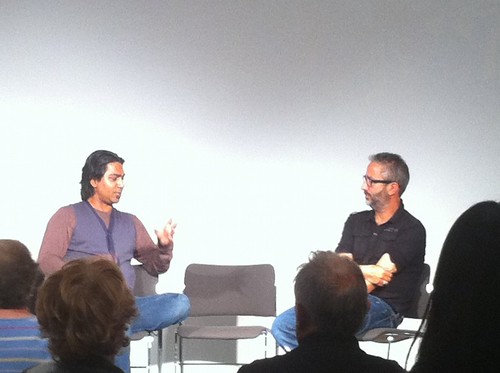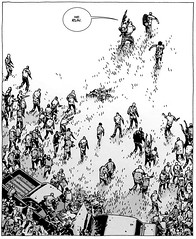
My brother had a play read at the Jewish Museum tonight. Idiot that I am, I got stuck in traffic and missed the opening scenes, but caught the vast majority of it superbly read by the assembled cast, which included Chinese Elvis amongst their number (seriously, that’s his alias). I’m afraid I’m rubbish at names so couldn’t help with the rest of them, but they did a remarkable job, notwithstanding the fact they had read the play together for the first time at 2pm the same afternoon.
It was a fantastic experience – I felt the usual sense of brimming pride I have whenever I see something my brother has produced or written (in this case the latter), but amplified by the sentiment expressed in this story, which despite being very alien to my practical experience of the world, captures something universal and wonderful about identity, about sympathy, about humanity, about loss and redemption, about love, about friendship.
The story – which Arvind and I discovered in the same place, Neil Gaiman’s Sandman graphic novel ‘Fables and Reflections‘ – is based on the historical character Joshua Norton, an erstwhile resident of Britain and South Africa. On failing in a massive series of investments in rice, young Mr Norton went off piste and reappeared a half dozen years later in San Francisco, proclaiming himself ‘Emperor Norton I’ and – on gaining the support of a local newspaper and various local businesses and people – became a champion of the American dream. Opportunity for all – rights for all – equality for all. A second chance, your ‘caste’ washed away. Proclamations follow about slavery, about prejudicial treatment of the Chinese, about the Civil War, about a dozen other social issues (and several arguably less significant ones, including prohibiting the shortening of the name of his adopted city to ‘Frisco’). Particularly poignant in the years leading up to the Civil War. It follows his years as Emperor to his death, and the remarkable relationships he had along the way.

Norton’s a fascinating Character. Arvind noted in the Q&A (ably hosted by his friend, writer David Baddiel) that in many respects he imagined the character Norton was running from something and the persona of Emperor that he created was his way of recovering from his earlier losses and failure – in the business world, certainly, but in the story – from a lost love as well. On feeling that the moment of destiny was upon him – he seized the totem of his redemption (a tall beaver-skin hat) and embraced the salvation of the American dream in his role as Emperor of America. His visions of Universal Suffrage, of heavier-than-air flight, of a bridge spanning the San Francisco Bay – were remarkably prescient. 20,000 people attended his funeral and there is a plaque to his memory at the base of the Golden Gate bridge.
Astonishingly, a distant descendant and family historian of the Emperor attended the reading and gave my brother some vital pointers on the facts behind the story in the Q&A – which Arvind duly appreciated and will no doubt incorporate some of into his next draft – but minor factual inaccuracies aside, it was a wonderful and entertaining performance, and a great story well told. Rough edges, to be sure, but that’s what this sort of thing is for.
Look for it next summer – it’ll hopefully have had the few bits of rewriting it needs and the production support it warrants and be on at a theatre in London somewhere. The Jewish Museum people were lovely and offered to host the after party (it’s a great venue), so that part’s sorted.
Proud of you, Arvind.
Postscript: Just discovered at least three Emperor Nortons on Twitter. The legacy lives on…
 I’ve never been particularly interested in art. When I was a kid, visiting the UK with my family, I remember near-terminally long visits to the National Gallery – the principle purpose of which always seemed to be to buy prints from the Great Masters (Van Gogh, Constable etc) for our house in Malaysia. I was always hopeless at actually creating anything, which I think served to dim my interest and aspirations in that direction, despite Mr Kwan and Miss Genting’s best efforts at our art classes – at home and at school.
I’ve never been particularly interested in art. When I was a kid, visiting the UK with my family, I remember near-terminally long visits to the National Gallery – the principle purpose of which always seemed to be to buy prints from the Great Masters (Van Gogh, Constable etc) for our house in Malaysia. I was always hopeless at actually creating anything, which I think served to dim my interest and aspirations in that direction, despite Mr Kwan and Miss Genting’s best efforts at our art classes – at home and at school. 











